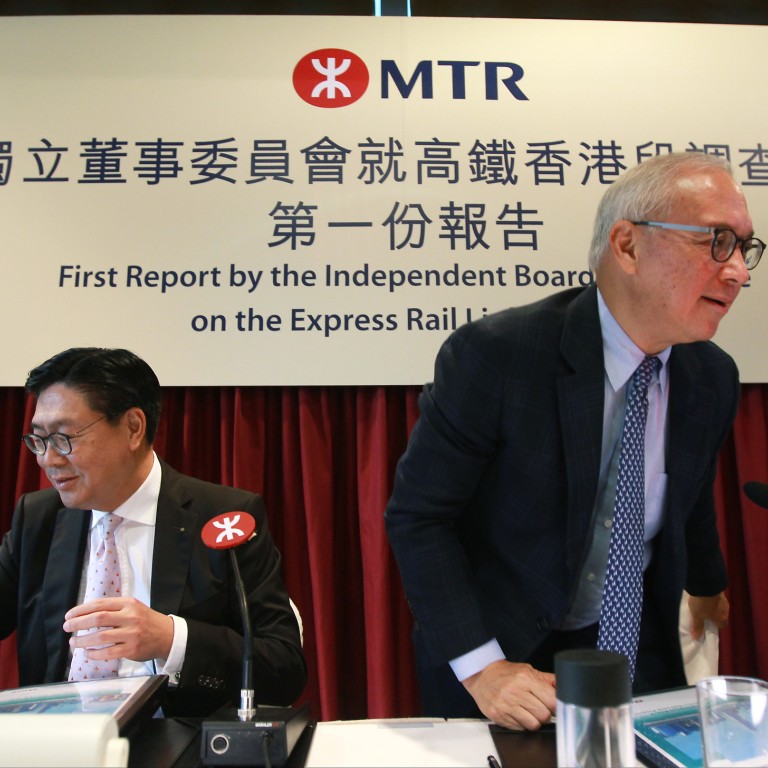
Did MTR fail shareholders by not disclosing rail project delay sooner?
Albert Cheng says the findings of an internal investigation show several points when the company could have made public the problems
The findings of an internal investigation into the two-year delay of the MTR Corporation's express rail link project, released last week, have been widely dismissed as a whitewash in the media.
The 93-page report - by a committee set up by the company's board - concluded that the handling of the project delay had led to a serious loss of credibility for the company. However, it does not recommend taking any action against any of its officers responsible for overseeing the construction work.
If one reads the report's chronology of events carefully, there would seem to be a strong case for the Securities and Futures Commission to look into whether the MTR board failed to comply with the statutory requirements to disclose price-sensitive, or inside, information in an appropriate and timely manner.
In this case, the MTR's failure to do so appears to have compromised shareholder interests.
According to the report, the first sign of trouble surfaced at a meeting as early as April last year, when the principal contractor for the West Kowloon terminal told the MTR's project team for the Hong Kong section of the Guangzhou-Shenzhen-Hong Kong express rail link that the 2015 timetable could not be met.
The carried an exclusive story on the problem in May last year. The MTR responded with a flat denial.
Since then, the problem has worsened. The corporation eventually announced on April 15 this year that the completion date for the project was being revised to 2017.
Construction costs for the 26km rail link were originally estimated at HK$62.4 billion in 2009 prices. The figure has subsequently been revised to HK$81.7 billion. The MTR Corp has yet to tell the public how much the price tag is expected to rise further. It also remains unclear how much the company will lose in terms of foregone revenue because of the significant delay. It is reasonable to assume that the delay of this key infrastructure project will affect the MTR share price.
The saga has also called into question the ability of the corporation to undertake four other extensions of existing MTR lines at the same time.
In July last year, the MTR's projects director, Chew Tai-chong, updated chief executive Jay Walder and other senior executives, and asked the executive directors to endorse pushing back the opening date from August to December 2015.
The revised plan was presented to the government in August 2013. At about this time, independent non-executive director Abraham Razack asked about the possible delay. His question was brushed aside.
As revealed in the paper, "versions of the July presentation were made to government and the executive committee of the corporation in September 2013. Throughout this period, the divergence between actual and planned progress continued to escalate."
Other directors questioned the progress of the project in meetings in August and December. They, too, were not given the full picture .
The need to inform the public only dawned on the government in November, when officials realised they were due to report to the Legislative Council panel on transport's subcommittee on matters relating to railways later that month .
Officials opted to go along with the MTR Corp in not telling lawmakers.
In an MTR board meeting last December, Walder chose not to even notify other directors of the setbacks.
On March 31, the contractor confirmed that the 2015 deadline was unachievable, even a partial opening. It took Chew 12 days to relay the news to the MTR executive committee. Walder then informed his chairman, Raymond Chien Kuo-fung, and Secretary for Transport and Housing Anthony Cheung Bing-leung.
Two days later, the government told Chien that Cheung would break the news the next day.
At the MTR annual general meeting in May, an individual shareholder asked why its annual report, which covered the year until March 31, had continued to affirm that the express link would be operational in 2015 as scheduled.
In reply, Chien said the MTR had become aware of the situation only in April. That was hardly the whole truth. Chien had been told about the inevitable delay in April, but he and his team had been aware of the deteriorating situation for at least a year.
The MTR Corp could have informed the public on several occasions. But its management made a collective decision not to do so until the problem became too big to contain.
It is legitimate for shareholders to ask, and regulators to investigate, whether the news blackout for a year had anything to do with any attempt to bolster share prices by keeping investors in the dark.

